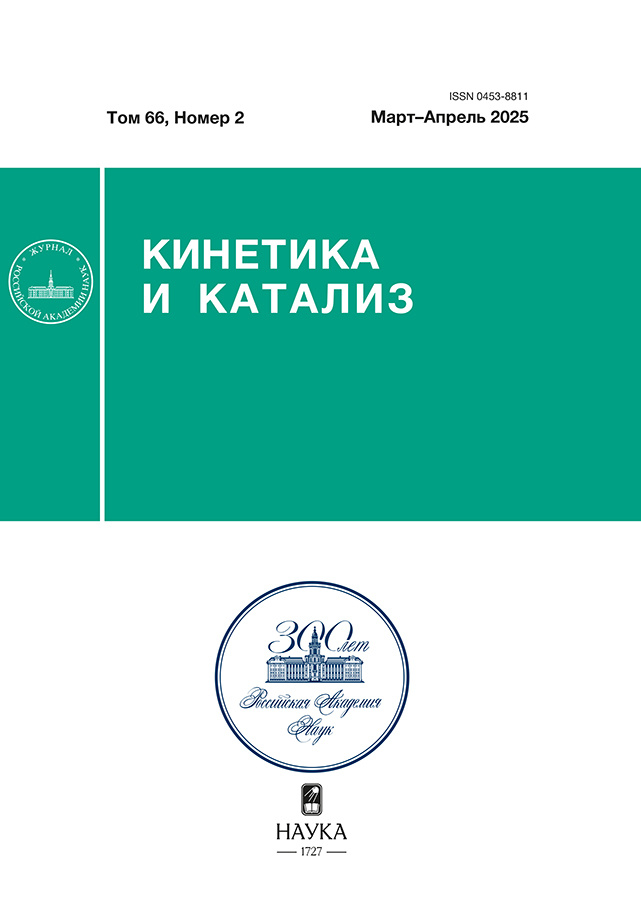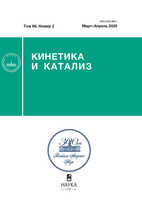Kinetika i kataliz
Media registration certificate: № 0110218 от 08.02.1993
Founders: Russian Academy of Sciences, Institute of Organic Chemistry of RAS
Editor-in-chief: Bukhtiyarov V.I., academician RAS, Doctor of Sc., Full Professor
Frequency / Access: 6 issues per year / Subscription
Included in: White list (2nd level), Higher Attestation Commission list, RISC
Edição corrente
Volume 66, Nº 2 (2025)
- Ano: 2025
- Artigos: 8
- URL: https://stomuniver.ru/0453-8811/issue/view/13854
Edição completa
ARTICLES
Oleg Naumovich Temkin (on his 90th birthday)
 65-66
65-66


Pt–Ga catalysts based on highly porous silica mcm-41 for propane dehydrogenation
Resumo
Highly porous SiO2 supports with the MCM-41 structure were synthesized by template method. Pt–Ga catalysts for propane dehydrogenation were obtained using the impregnation method. The structure of the synthesized samples was studied by low-temperature nitrogen adsorption and X-ray phase analysis (XRD), and the properties of catalyst reduction were studied by temperature-programmed reduction in hydrogen (TPR-H2). The catalytic properties were studied in the reaction of propane dehydrogenation, and the influence of hydrogen in the composition of the reaction mixture was studied. It has been shown that the addition of hydrogen into the reaction mixture leads to an increase in the stability and activity of platinum catalysts.
 67-79
67-79


The interaction of hydrazine monohydrate with the surface of metal-containing catalysts
Resumo
The interaction of hydrazine monohydrate with nickel on various carriers has been investigated using a range of physical and chemical methods. Hydrazine monohydrate adsorbs on catalysts, both active and inactive, in the infrared region of the spectrum. The location of the particles of adsorbed hydrazine monohydrate is on the carrier. There was no correlation found between the spectral features on several of the catalysts studied and their catalytic activity in hydrogen formation. The main transformation reactions occur in the metallic phase of the supported catalysts. It was found that, due to the reaction energy, the size and structure of the clusters were reduced and rearranged to create centers suitable for the effective course of intramolecular dehydrogenation of hydrazine. At the same time, this process was most effective on smaller clusters, possibly because a stronger Me-H bond was formed on them. Adsorption of hydrazine monohydrate through hydrogen atoms was possible on these clusters. These conditions ensured the predominant formation of hydrogen at low temperatures. An increase in temperature contributed to the course of a competing reaction of ammonia formation, associated with the breaking of the N-N bond in the adsorption complex. As result, the formation of NH2 complexes is taking place, and then ammonia.
 80-90
80-90


Mathematical modelling of complex oscillations during ethylene oxidation over nickel catalyst
Resumo
The article is devoted to the experimental and theoretical study of complex oscillations during ethylene oxidation on the nickel foil. Mathematical model was based on the 14-stage mechanism of reaction including the stages of oxidation and reduction of the Ni catalyst. An essential condition for the occurrence of an oscillatory behavior of the system was the adsorption of C2H4 and CO from the mobile pre-adsorption state. It was shown that for real values of the parameters, the mathematical model can describe both regular and irregular oscillations, as well as the “mixed-mode” oscillations observed in the experiment. For the first time oscillations with different properties and distinct mechanisms of their occurrence were detected in the same model. It was demonstrated that oscillations occurred as a result of a strong dependence of the reaction rate on the concentration of active sites both due to a variation in the concentration of the surface oxide or the surface carbon.
 91-103
91-103


VIII Международная научная школа-конференция молодых ученых “Катализ: от науки к промышленности” (30 сентября–3 октября 2024 г., Томск)
Effect of modification method of TiO2 nanotubes with Cu2O on their activity in photoelectrochemical water splitting
Resumo
TiO2 nanotube array electrodes for the photoelectrochemical process of water splitting were modified with Cu2O, p-type semiconductor (p-Cu2O). By employing the cyclic voltammetry (CV) method to deposit p-Cu2O nanoparticles, a more uniform particle distribution was achieved over the inner and outer surfaces of TiO2 nanotubes. The measurements of incident photon-to-current conversion efficiency (IPCE) in the range of 365-660 nm demonstrated that the proposed method significantly enhance photoactivity in the visible light region compared to the potentiostatic deposition method. The IPCE value was 0.18% at a wavelength of 523 nm, which was 7 and 45 times higher than for the potentiostatic modified and pristine samples, respectively. Under continuous illumination with visible light at a wavelength of 523 nm and a potential of 0.2 V (Ag/AgCl (sat.)), the transition from Cu2O to CuO was observed for 5 hours, accompanied by a decrease in photocurrent density.
 104-115
104-115


Catalytic properties of a nanozyme based on silver nanoparticles immobilized in a polymethacrylate matrix
Resumo
This article presents studies on the catalytic, peroxidase-like properties of silver nanoparticles (Ag NPs) immobilized in polymethacrylate matrix (PMM). Ag NPs were prepared by thermal reduction of silver cations pre-immobilized in PMM. The morphology of the nanocomposite was studied using scanning electron microscopy, and the average size of the synthesized individual spherical nanoparticles was 18 ± 5 nm. It was demonstrated that silver nanoparticles immobilized in a polymethacrylate matrix (PMM-Ag0) exhibit pronounced peroxidase-like activity in the oxidation reaction of the chromogenic substrate – indigocarmine in the presence of H₂O₂. The Michaelis–Menten model was used to assess the kinetic parameters of the reaction. The values of Michaelis constant (Km) observed for indigocarmine and H₂O₂ (0.1 mM and 1.0 mM, respectively) show strong affinity of the substrates to silver nanoparticles in PMM.
 116-125
116-125


Active and stable Ni/Al2O3–(Zr+Ce)O2 catalyst for syngas production via glycerol dry reforming
Resumo
A nickel-based catalyst supported on alumina-zirconia-ceria oxides was investigated to evaluate its performance in the dry reforming of glycerol with CO₂. The reaction was carried out at 700°C, atmospheric pressure and a glycerol/CO₂ molar ratio of 1. The catalyst showed stable operation for 7 h and achieved glycerol and CO₂ conversions of 60 and 47%, respectively, with H₂ and CO yields of 48 and 58%. Thermogravimetric analysis revealed the presence of carbon deposits, which, however, did not result in a significant loss of activity. These results highlight the potential of the synthesized catalyst for glycerol conversion for the production of syngas and hydrogen from renewable feedstock.
 126-135
126-135


XPS study of [Ir(COD)Cl]2–L–SiO2 catalytic system
Resumo
The X-ray photoelectron spectroscopy (XPS) and nuclear magnetic resonance (NMR) spectroscopy were used to study the features of anchoring of the [Ir2(COD)2Cl2] complex on the surface of modified silica gel L–SiO2 (where L is NC5H5–CH2–CH2–, N(CH3)2–CH2–CH2–CH2–, NH2–C3H6–) depending on the nature of the linker and the conditions of preparation of the systems. The catalytic activity was tested in reactions of gas-phase selective hydrogenation of propylene with parahydrogen (p-H2). According to the XPS data, a single-site iridium catalyst is prepared in all cases. Analysis of the XPS spectra indicates the possibility of anchoring the complex through one of the Ir atoms while preserving the dimer. It was shown that at different durations of interaction of the iridium complex solution with modified NH2–C3H6– silica gel approximately the same amount of the complex is anchored, but the nature of the complex coordination changes. For the sample obtained by long-term interaction of the complex solution with the modified support (24 h), a high increase in the NMR signal was observed at 60°C, while in the case of the sample prepared by short-term interaction (1 h), the signal increased with a rise in temperature to 80°C.
 136-146
136-146












